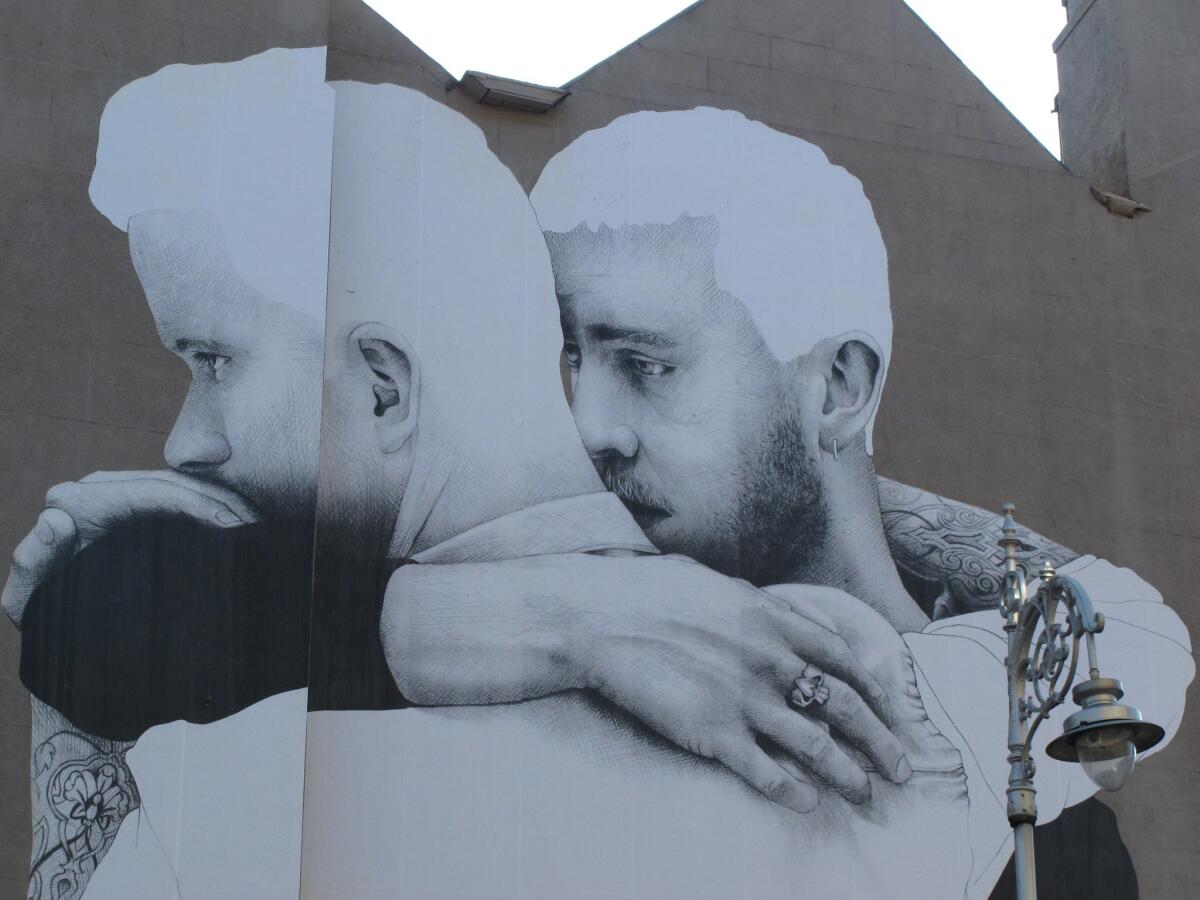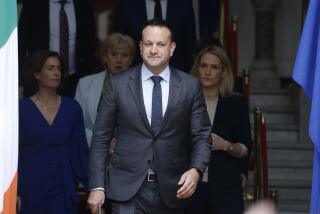In heavily Catholic Ireland, voters to decide on same-sex marriage

A gay rights mural adorns the side of a building in Dublin, Ireland. The country is holding the world’s first national referendum on same-sex marriage on May 22.
- Share via
Joe Masterson isn’t your typical gay rights activist.
A 72-year-old Irish farmer, he grew up in an era when such matters were simply not discussed. But there he was, going door to door this week asking neighbors in the small village of Castlepollard to support a proposal to allow same-sex couples in Ireland to marry.
He was not alone. Opinion polls suggest that this once deeply conservative and still overwhelmingly Roman Catholic country could become the first to legalize gay marriages through a popular vote Friday.
That such a milestone could be reached in a country that did not decriminalize homosexuality until 1993, is evidence of how quickly attitudes have changed and of the declining influence of the church after a succession of child abuse scandals.
In spite of the church’s opposition, the government and all the main political parties have come out in support of the proposal to introduce a line into Ireland’s Constitution that says: “Marriage may be contracted in accordance with law by two persons without distinction as to their sex.”
They have been joined by major businesses, trade unions, media organizations, sports stars and other celebrities. Even some Catholic priests have said they back the amendment.
Still, analysts caution that the margin of support has narrowed in recent weeks and the vote’s outcome is not certain. They suspect that some conservative voters might be shy about publicly saying they are likely to vote no.
“Everything hangs on who turns out on Friday,” said David Farrell, a politics professor at University College Dublin. Support for the amendment is strongest among young, urban voters, but turnout is usually higher among their older, rural counterparts.
Masterson was taking nothing for granted as he headed out for one last night of handing out leaflets before campaigning was officially halted Thursday.
For him, the issue is personal. Masterson’s son, Allan, the youngest of three children, was about 20 years old when he finally confided to his dad that he might be gay. Masterson gave his son a hug and told him it wouldn’t change anything. But inside, he worried whether others in the family would respond as he did.
It wasn’t until years later, when the young man married his longtime partner in the Netherlands, that his father realized how much support there was for him. Aunts, uncles, cousins traveled from near and far to celebrate the marriage. Now, Masterson would like the union to be recognized in Ireland, in case his son should want to move back with his husband one day.
“It should be the same for everybody,” he said. “It shouldn’t be a them-and-us issue.”
To opponents, the proposal is an assault on traditional values that would encroach on religious beliefs and redefine marriage in ways they fear would harm children.
They have draped city lampposts with posters featuring a pair of parents kissing a rosy-cheeked infant. “Children deserve a mother and a father. Vote no,” it says.
“It does seem strange to me that we have reached a point not just in Ireland, but in Western society, where we are suddenly doubting the intrinsic value of mothers and doubting the intrinsic value of fathers,” said David Quinn, founder of the Iona Institute, a conservative religious advocacy group.
He argues that approving the amendment would have broad implications, making it extremely difficult, for example, for Parliament to approve an adoption or surrogacy law that says, “actually it’s in the best interests of the child to have a mother and a father, all other things being equal.”
The debate has played out on television screens and in homes across the island nation.
“I am told that I am not broad-minded enough and I’m old-fashioned,” said Una Heaton, a 65-year-old artist and museum curator in Limerick, the country’s third-largest city, who planned to vote no Friday. “But it’s nothing to do with being broad-minded; it’s to do with marriage and children.”
“I see nothing wrong with gay friends having civil relationships, but gay marriage is a step too far,” she said. “And putting it in our constitution is bonkers.”
Unlike in the United States, where the issue has been taken up by the Supreme Court, a simple majority of voters will decide whether to legalize same-sex marriage in Ireland. Seventeen countries have already done so, all of them through legislation or court rulings. Ireland would have to change its constitution, which requires a referendum.
The results are expected on Saturday, which happens to be the day of the Eurovision song contest. That could make Saturday “the gayest day in Irish history,” quipped Rory O’Neill, the drag queen known as Panti Bliss, in an interview with the Independent newspaper of London.
Same-sex couples have been able to enter into civil partnerships in Ireland since 2011, but activists argue that those don’t afford the same rights and protections as being legally married.
“In symbolic terms, it is also incredibly important because it says to Irish lesbian and gay people, especially young people, that they too can grow up in a country that values them,” said Brian Sheehan, codirector of Yes Equality, the umbrella group that leads the yes campaign.
Until recently, he said, many people had to emigrate if they wanted to be open about who they were. The decriminalization of homosexuality allowed thousands more to come out of the closet, a big part of the change in Ireland, Sheehan said.
One of the things he found most moving about the campaign was the number of parents who became advocates for their gay children. They include people as prominent as former President Mary McAleese, a devout Catholic who spoke about the bullying endured by her son, Justin.
“We who are parents, brothers and sisters, colleagues and friends of Ireland’s gay citizens know how they have suffered because of second-class citizenship,” she said at an event this week.
The debate also prompted top political figures such as Health Minister Leo Varadkar and former Equality Minister Pat Carey, who are both gay, to speak publicly about their sexuality for the first time. Both remarked on the warm response they received. The conservative-leaning prime minister, Enda Kenny, paid a visit to one of Dublin’s more prominent gay bars in December.
Church leaders have also stepped into the fray, distributing pastoral letters to their congregations. But Farrell, of University College Dublin, said that “they’re pulling their punches a lot more than they used to.”
“This one referendum we’re having on marriage equality personifies very well just how far the relations between church and state have changed,” he said.
Irish political leaders have long deferred to the church, especially on matters of social policy. Contraceptives were only fully legalized in 1985. Divorce was outlawed until 1995, and abortion is still banned in most cases.
But a series of damning reports detailing decades of sexual abuse of children by clerics and efforts of church officials to protect the abusers rather than the victims was met with a public outcry and calls for a break between church and state. The scandals came at a time of spreading secularization in Ireland, which began with the economic boom of the 1990s.
Archbishop Eamon Martin took pains to emphasize in a statement posted on YouTube that gay people “ought always to be treated with respect and sensitivity.” But he said Irish bishops can’t support an amendment that “places the union of two men or two women on a par with a marriage between a man and woman, which is open to the procreation of children.”
Such arguments have been hard for Louise Fitzgerald to hear. The 29-year-old radiographer is planning to marry her partner, a female police officer. She already has a wedding venue picked out in her hometown of Cork.
“All I want to do is quietly live my life with my partner and get on with work, and I feel like my character and her character are being laid bare and dissected in public,” Fitzgerald said on Wednesday.
She was planning to do some canvassing that night, but was nervous about how she would be received. “It’s a strange thing to have to go up to someone’s door and ask them if it is OK if I get married,” she said.
She was born in Wales, where same-sex marriage is now legal, and is thinking of going there to get married if the referendum doesn’t go her way.
“It means the world to have that piece of paper,” she said, “just to have a proper marriage somewhere.”
Special correspondent Kathryn Hayes in Limerick, Ireland, contributed to this report.
For more international news, follow @alexzavis on Twitter
More to Read
Sign up for Essential California
The most important California stories and recommendations in your inbox every morning.
You may occasionally receive promotional content from the Los Angeles Times.














